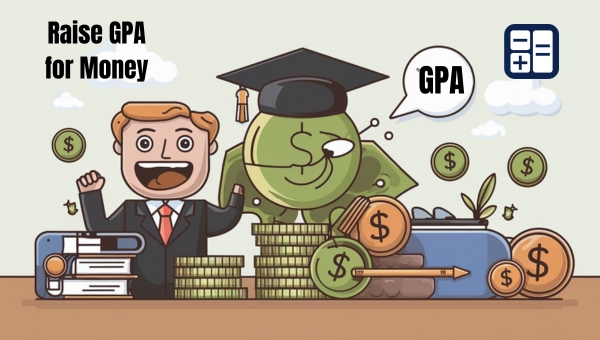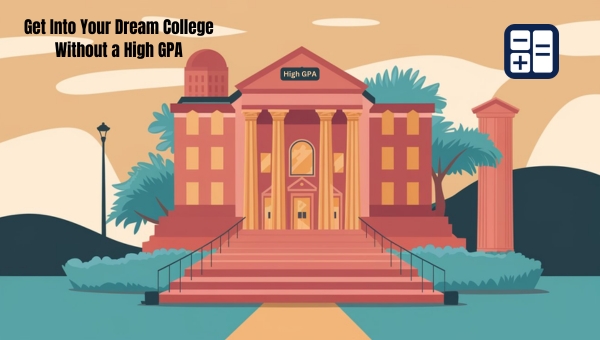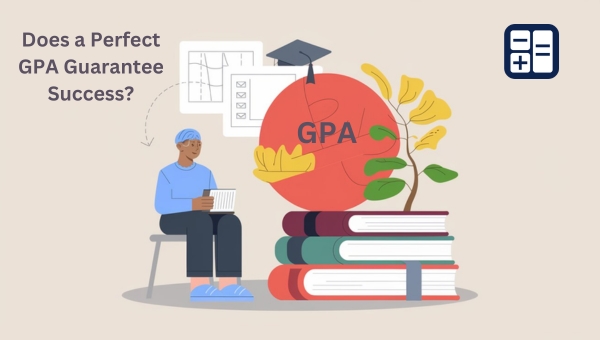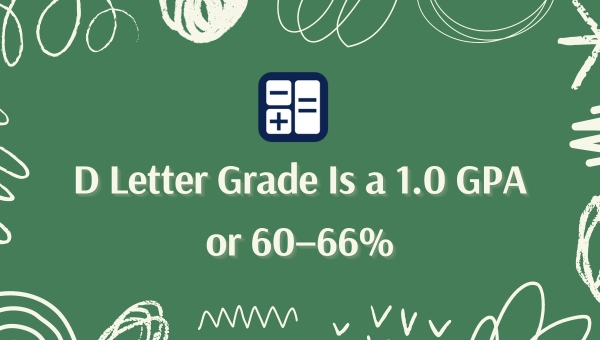C+ Letter Grade Is a 2.3 GPA or 77–79%
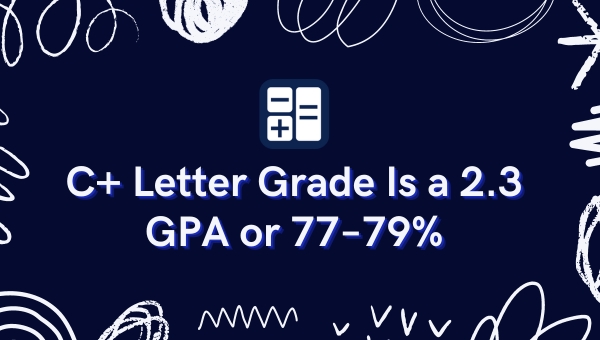
You might be wondering what a C+ letter grade really means for your academic journey. With a GPA of around 2.3 and a percentage range of 77% to 79%, a C+ reflects adequate performance but hints at untapped potential.
While it shows you’re managing your coursework, it also signals areas ripe for improvement. How does this grade affect your future opportunities, such as college admissions or scholarships? Let’s explore proven strategies to boost your GPA and ensure you’re set up for success.
What is a C+ GPA?
A C+ GPA represents a grade point average of approximately 2.3 on a 4.0 scale. This means that, on average, your grades are slightly above a C, but not quite reaching a B. It’s a middle-ground score that indicates you’ve been performing adequately in your coursework, though there’s definitely room for improvement.
In most grading systems, a C+ corresponds to a percentage range of about 77% to 79%. This percentage is a reflection of your overall performance across various assignments, tests, and projects. Essentially, you’re doing better than just passing but you’re not excelling either.
Understanding this GPA is crucial because it can impact your academic trajectory. If you’re aiming to get into certain programs or schools, they might’ve minimum GPA requirements that a C+ may or may not meet.
It’s also important to consider how this GPA reflects your grasp of the material. While you’re grasping the basics, you might need to put in extra effort to strengthen your understanding and boost your grades.
A C+ GPA serves as a useful indicator of where you stand academically and highlights areas where you can focus on improvement.
What does a C+ GPA mean for high school students?
With a C+ GPA, you might need to adjust your college application strategy. Safety schools could be more realistic options, while target schools may require extra effort in other areas like extracurriculars or essays.
Dream schools might be a stretch, but strong recommendations and a compelling personal story can still make a difference.
Safety Schools
Navigating the college admissions process with a C+ GPA can feel challenging, but it doesn’t mean you’re out of options. Safety schools are institutions where your academic qualifications, including your GPA, match or exceed the average student profile. They offer a higher likelihood of acceptance and can be a solid foundation for your future.
Here’s how you can approach safety schools effectively:
1. Research Appropriately: Look for colleges with average GPA requirements around 2.3. Community colleges, state universities, and certain private institutions often have more flexible admission standards.
Make a list of these schools and evaluate their programs, campus life, and financial aid options.
2. Strengthen Your Application: Highlight your strengths beyond your GPA. Emphasize your extracurricular activities, volunteer work, or any unique experiences.
A compelling personal statement and strong letters of recommendation can also make a significant difference.
3. Visit and Engage: Schedule campus visits and engage with admissions counselors. Showing genuine interest can improve your chances of getting accepted.
Attend open houses, take campus tours, and ask questions to demonstrate your enthusiasm and commitment.
Target Schools
While safety schools provide a reliable backup, you shouldn’t overlook target schools that align more closely with your academic profile.
A C+ GPA, translating to a 2.3 GPA or 77-79%, might seem limiting, but it doesn’t mean your college options are non-existent. Instead, it calls for a strategic approach in identifying institutions where your academic performance fits well within the accepted range.
When considering target schools, focus on those where the average GPA of admitted students closely matches your own. Here are three steps to guide you:
- Research Schools’ Admission Statistics: Look for colleges where the average GPA falls between 2.0 and 3.0. This ensures you’re aiming for institutions where your GPA won’t be a significant hurdle.
- Leverage Other Strengths: Highlight extracurricular activities, leadership roles, and personal achievements in your application. Colleges often consider the whole student, not just grades.
- Seek Supportive Environments: Some colleges have robust support systems like tutoring and academic advising to help students succeed. Target schools that invest in student development.
Dream Schools
Dream schools often represent the pinnacle of aspiration for high school students, but a C+ GPA can complicate this dream. Admissions committees at top-tier universities typically look for higher GPAs, along with strong extracurricular involvement, leadership roles, and excellent recommendation letters.
However, a C+ GPA doesn’t mean your dream school is entirely out of reach. Here’s what you can do:
- Show Improvement: Demonstrate an upward trend in your grades. Colleges appreciate students who show resilience and a commitment to improving their academic performance. If your GPA has been steadily rising, it could work in your favor.
- Excel in Other Areas: Shine in other aspects of your application. Highlight your extracurricular activities, leadership roles, community service, and any awards or recognitions you’ve received. These can help offset a lower GPA.
- Craft a Compelling Personal Statement: Use your personal statement to tell your story. Explain any extenuating circumstances that may have impacted your GPA and emphasize your strengths, passions, and unique experiences. Authenticity and reflection can make a significant difference.
Proven Tips to Get a C+ GPA
To achieve a C+ GPA, it’s crucial to set realistic study goals and use effective study techniques.
Managing your time wisely and seeking academic assistance when needed can make a significant difference.
Stay consistent and persistent in your efforts, and you’ll see improvement.
Set Realistic Study Goals
Setting realistic study goals is essential if you’re aiming for a C+ GPA. First, assess your current academic standing. Knowing where you stand allows you to set achievable targets. Don’t aim for perfection; instead, focus on small, incremental improvements. For example, if you’re scoring 70% in a subject, aim for 73% next time.
Break down your goals into manageable tasks. Rather than saying, “I need to study more,” set specific objectives like, “I’ll study math for 30 minutes every day.” This makes your goals tangible and easier to track. Use a planner or digital calendar to schedule study sessions and stick to it.
Prioritize your subjects based on difficulty and importance. If you find chemistry challenging, allocate more time to it. Balance is key; don’t neglect other subjects while focusing on one.
Regularly review and adjust your goals. If you find you’re consistently hitting your targets, raise the bar slightly. Conversely, if you’re struggling, reassess and modify your goals to be more attainable.
Lastly, reward yourself for meeting your goals. It doesn’t have to be anything big—a small treat can keep you motivated. By setting realistic study goals, you’ll be on the right path to achieving that C+ GPA.
Utilize Effective Study Techniques
Once you’ve set realistic study goals, the next step is to utilize effective study techniques to achieve that C+ GPA.
Start by organizing your study materials. Keep your notes, textbooks, and assignments easily accessible. This helps you quickly find what you need without wasting time.
Next, use active learning methods. Instead of passively reading your textbooks, engage with the material. Summarize key points in your own words, create flashcards, or teach the concepts to a friend. This reinforces your understanding and retention.
Break study sessions into manageable chunks. Use the Pomodoro Technique, where you study for 25 minutes and then take a 5-minute break. This keeps your mind fresh and focused.
Don’t forget to review regularly. Revisiting material periodically helps cement the information in your long-term memory. Incorporate different types of review, like practice problems or quizzes, to test your knowledge.
Manage Time Wisely
Managing your time wisely is crucial for achieving a C+ GPA. Start by planning your week in advance. Use a planner or digital calendar to block out specific times for studying, attending classes, and completing assignments. This helps you stay organized and ensures you’re not scrambling at the last minute.
Prioritize tasks based on their deadlines and importance. Break down larger projects into smaller, manageable tasks. By tackling these smaller tasks daily, you’ll reduce stress and avoid the dreaded all-nighter.
Don’t forget to include breaks in your schedule. Short, regular breaks can actually boost productivity and prevent burnout.
Eliminate distractions during study time. Find a quiet place to work where you won’t be interrupted. Turn off notifications on your phone and computer to stay focused on the task at hand. If you’re easily distracted, consider apps that block distracting websites.
Lastly, set realistic goals for each study session. Instead of aiming to study for hours on end, set a goal to complete a specific chapter or set of problems. This way, you’ll have a clear target and a sense of accomplishment when you’re done.
Seek Academic Assistance
To boost your chances of achieving a C+ GPA, don’t hesitate to seek academic assistance. Start by taking advantage of your school’s tutoring services.
Many schools offer free tutoring sessions that can provide you with personalized help in areas where you struggle. Tutors can break down complex topics and offer study techniques tailored to your needs.
Another valuable resource is your professors’ office hours. Professors are there to help you succeed, so make an appointment to discuss difficult material or ask for clarification on assignments. This shows initiative and can provide insights that aren’t always covered in class.
Study groups are also a great way to improve your understanding of the subject. Collaborating with your peers can expose you to different perspectives and problem-solving techniques. Plus, explaining concepts to others can reinforce your own understanding.
Don’t overlook online resources. Websites like Khan Academy, Coursera, and even YouTube offer tutorials on a wide range of subjects. These can supplement your learning and provide alternative explanations for challenging topics.
Lastly, consider hiring a private tutor if you need more personalized attention. While this can be costly, the investment might be worth it to achieve your academic goals.
Stay Consistent and Persistent
Achieving a C+ GPA requires consistent effort and persistence throughout the semester. You need to develop a study routine that fits your lifestyle and stick to it. Dedicate specific times each day for studying, reviewing notes, and completing assignments. This helps reinforce what you learn and keeps you on track.
Don’t underestimate the power of setting realistic goals. Break down your tasks into manageable chunks. Instead of aiming to study for five hours straight, focus on completing one chapter or finishing a set of practice problems. Small, achievable goals can lead to significant progress over time.
Stay organized. Use a planner or digital app to keep track of deadlines, test dates, and important assignments. This ensures you won’t miss critical tasks and helps you manage your time effectively.
Join study groups or find a study buddy. Collaborating with peers can provide different perspectives and make studying less monotonous. Plus, explaining concepts to others reinforces your own understanding.
Lastly, don’t get discouraged by setbacks. Everyone faces challenges, but persistence will pay off. Learn from your mistakes, seek help when needed, and keep pushing forward. By staying consistent and persistent, you’re more likely to achieve that C+ GPA.
How to Raise Your GPA Fast?
Raising your GPA fast requires a strategic and focused approach. First, identify the classes where you can make the biggest impact. Prioritize courses that offer a lot of credit hours or those in which you’re close to the next grade level. By focusing on these, you can maximize your GPA boost efficiently.
Next, communicate with your professors. Don’t hesitate to ask for extra credit opportunities, clarifications on past assignments, or feedback on how you can improve. This shows initiative and can sometimes lead to leniency or additional support.
Effective time management is crucial. Create a study schedule that allocates time to your most challenging subjects. Use planners or digital apps to stay organized and ensure you’re meeting all deadlines. Avoid procrastination by breaking tasks into manageable chunks and tackling them consistently.
Additionally, form study groups with classmates. Collaborative learning can reinforce your understanding of the material and provide different perspectives. Sometimes, explaining concepts to others can deepen your own comprehension.
Lastly, seek tutoring if necessary. Many schools offer free tutoring services, or you can hire a private tutor. Having someone to guide you through difficult topics can be invaluable.
Conclusion
Improving a C+ GPA is within your reach. Understand that a C+ reflects solid effort but also shows room for growth. Focus on your study habits, seek help when needed, and prioritize your coursework.
Remember, colleges look at the whole picture, so highlight your strengths and unique qualities in applications. By staying motivated and proactive, you can boost your GPA and broaden your academic opportunities. Keep pushing forward; your hard work will pay off.
